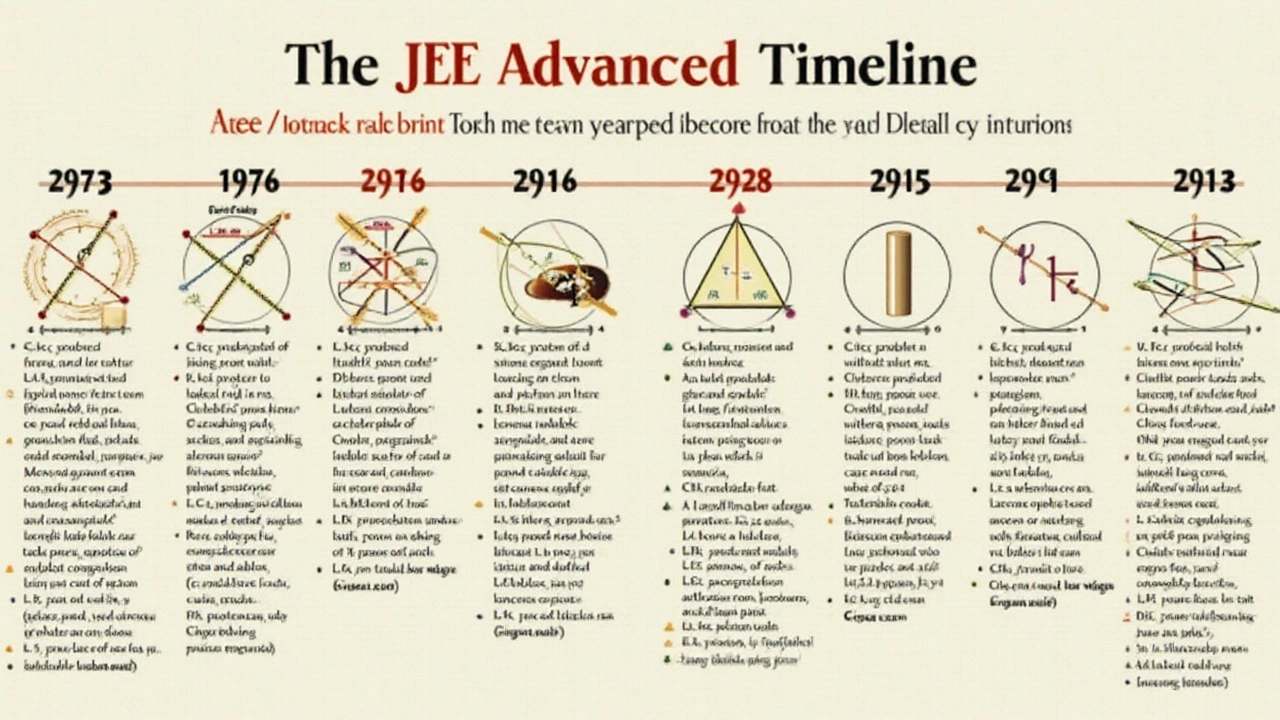Cracking the JEE Advanced is a dream for many aspiring engineers, but it's no secret that the path is paved with challenging exams designed to test even the brightest minds. Amongst the various papers that have put aspirants to the test, some hold the reputation of being particularly tough, causing many sleepless nights. This exploration dives deep into the years and attributes that have made certain JEE Advanced papers stand out.
What exactly makes a JEE Advanced paper 'tough'? Is it the unexpected twists in problems, the sheer complexity, or perhaps the limitations of time? By exploring historical assessments, we shed light on this complex puzzle. We look back at the particularly daunting exams, attempting to decipher which year saw the most formidable challenge.
Join us as we uncover insights on navigating these exams and how understanding their evolving nature could equip future aspirants with the tools to excel. Through this journey, we aim to offer not just a look into the toughest papers but also provide strategies to turn this challenge into an opportunity for growth and success.
- Understanding JEE Advanced Difficulty
- Historical Analysis of Toughest Papers
- Factors Contributing to Paper Difficulty
- Notable Tough Papers in Recent Years
- Tips for Preparing for Difficult Exams
Understanding JEE Advanced Difficulty
The JEE Advanced exam is infamous for its complexity and high level of difficulty. Designed to select the best minds for prestigious IITs, this exam tests not only knowledge but also a student's ability to apply concepts in novel situations. Understanding what makes the JEE Advanced challenging involves delving into the structure of the paper, the nature of the questions, and the overall testing environment. The exam typically features rigorous problems that cover all possible corners of the syllabus, requiring students to go beyond rote learning and engage in critical thinking.
Each year, the JEE Advanced paper is crafted by a different IIT, allowing for diversity in style and emphasis on certain topics. For example, a particular year might focus more on Physics, diving deep into mechanics and thermodynamics, pushing the limits of students' understanding in those areas. Another year might thrust Chemistry center stage, with complex organic chemistry problems that weave in real-world applications, a reflective pattern that can be traced through past years' papers.
What truly sets the JEE Advanced apart is its unpredictability. You might be asked to solve a problem that requires merging concepts from both Mathematics and Physics, a challenge that tests your integrative thinking. This is not an exam where isolated study will bear fruit; it's an intricate dance of understanding and applying knowledge across disciplines. The time constraints also add to the pressure, as students not only have to solve these problems but do so under tight deadlines, often with no room for error.
Quotations of Wisdom
"The JEE Advanced tests a candidate's academic prowess as well as their mental agility," as famously noted by an IIT alumnus, highlighting the need for a balanced approach to preparation.
Statistics show that less than 1% of the applicants manage to secure a seat in one of the IITs, making it imperative for students to strategize their preparation effectively. Knowing past patterns can undoubtedly help, but it's equally crucial to cultivate a mindset that is ready to adapt. Many successful candidates suggest emphasis on mock tests, which simulate the real exam environment and allow students to practice time management skills.
Emphasizing effective study techniques can also play a significant role in overcoming the notorious difficulty of the JEE Advanced. It is essential to focus on understanding concepts rather than memorizing solutions. Engaging with problems through discussion groups or forums may also prove beneficial as it provides a platform for airing doubts and understanding multiple perspectives. The toughness of this exam doesn't solely challenge your academic abilities but also your endurance and adaptability. Future aspirants should be prepared not just academically but mentally equipped for the challenges that lie ahead.
Historical Analysis of Toughest Papers
The journey through the annals of JEE Advanced history reveals certain years that have truly pushed the limits of students' prowess. These exams aren't just a test of academic knowledge; they are marathons of endurance, stamina, and strategic thinking. To comprehend which papers stood as the most formidable foes, one needs to delve into the intricacies of paper design and student reception over the years. While the JEE Advanced is consistently strenuous by nature, certain iterations have left indelible marks on the memories of test takers, notorious for their intricate challenges.
Take, for instance, the year 2016, which many consider a benchmark for difficulty. The paper that year was laden with surprising complexities in its Physics section, where aspirants faced questions that required integrating concepts that spanned across several topics. As a result, students found themselves grappling not only with convoluted numerical problems but also with the pressure of applying theory in innovative ways.
Let's not forget the 2018 paper, which was renowned for a wholly different set of reasons. The Mathematics section, in particular, was a grueling test of both speed and precision. Students were met with questions that were significantly more time-consuming than usual, demanding an astute balance between accuracy and the ticking clock. This shift in question demands was attributed to a fresh academic philosophy aimed at separating mere rote learners from true conceptual thinkers. Such a deliberate design choice often defines these papers' legendary difficulty.
"The 2018 JEE Advanced was a turning point emphasizing quality over quantity," noted Dr. Ramesh Pokhriyal, former Minister of Education, during a post-exam analysis, shedding light on the evolving nature of this examination.
The years 2019 and 2021 further added layers to this saga. In 2019, the Chemistry section turned out to be particularly challenging, with obscure questions that demanded an in-depth understanding of organic chemistry reactions and mechanisms. Meanwhile, in 2021, the usually straightforward topics were made intricate with innovative problem-solving approaches, pushing even the well-prepared students to their limits.
Understanding why these particular years are etched in the minds of students involves appreciating the balance between predictability and novelty. Times when the JEE Advanced examiners leaned more towards novel approaches have naturally been more challenging. Any aspiring candidate looking to demystify the toughest papers should study the underlying themes and question trends that resurfaced across various years. Analyzing such patterns can provide invaluable insights, not just for acing the examination but also for nurturing a mindset adaptable to diverse academic challenges.

Factors Contributing to Paper Difficulty
When discussing the grueling nature of the JEE Advanced exams, one cannot overlook the myriad factors that contribute to their infamous difficulty. First and foremost, the complexity of the questions plays a significant role. The paper is designed to stretch the problem-solving capabilities of the aspiring engineers, often blending multiple concepts into a single puzzle. For instance, a single physics question could demand knowledge of electromagnetism, mechanics, and even basic calculus to solve. This intricate web of intertwined concepts tests not only a student’s understanding of the subjects but also their ability to apply theories in novel and unexpected ways.
Another crucial element is the unpredictability factor. Each year, the paper setters, who are often IIT professors with a deep understanding of the subjects, strive to introduce new and original questions. This absence of a predictable pattern makes rote learning ineffective. Students must cultivate a deep understanding of topics and maintain flexibility in their approach. The time constraint further adds a layer of pressure. Students may often find themselves hurriedly solving complex queries in an attempt to beat the clock, and this can lead to mistakes even among the exceptionally bright.
An essential yet overlooked aspect is the psychological pressure of the examination setting itself. The realization that the JEE Advanced is a make-or-break moment for their dreams of entering prestigious IITs often results in tremendous mental stress. This can impair even the most prepared individuals, making it crucial for students to focus on developing stress management techniques alongside academic preparation. The sheer competition is staggering. With lakhs of students vying for a limited number of seats, the bar for excellence keeps rising each year. As a result, what might once have been a moderately difficult paper is perceived as significantly harder because the margin for error narrows with the growing competition.
"The JEE Advanced tests more than just academic knowledge; it tests resilience, adaptability, and strategic thinking," says Professor Anil Kumar, a former paper setter. His view highlights the comprehensive nature of the exam and the need for a well-rounded approach to preparation.
Finally, the changing syllabus and introduction of new topics can also contribute to the difficulty. While the core subjects remain constant, the depth and scope of topics can vary from year to year, requiring students to stay updated with the latest trends in syllabi adjustments. In many cases, topics that were once not emphasized gain prominence, catching students off guard.
Understanding these factors is crucial for those preparing for the JEE Advanced. While the path may be steep and the paper tough, acknowledging these challenges can help candidates sharpen their strategies, ensuring they are well-equipped to tackle this formidable exam with greater confidence.
Notable Tough Papers in Recent Years
Over the years, the JEE Advanced has consistently been a rigorous test for students aiming for prestigious institutes like the IITs. However, certain years have certainly stood out in the collective memory of aspirants due to the surprising challenges they presented. One such notable year was 2016, where students were taken aback by a Physics section that bore complex problems applying multiple concepts at once. This set the paper's tone as notoriously tough, leaving many students and educators discussing its intricacies for months after. The physics paper in 2016, described by many as a blend of unexpected valences and challenging interpretations, demanded a deep integration of knowledge and quick, critical thinking.
Moving forward, the 2018 paper also garnered significant attention. Despite being labeled as 'easier' initially by some due to its even distribution of moderate to difficult problems, it was the time management aspect that created waves of concern. The Chemistry section, in particular, had a few lengthy problems that tricked students into spending more minutes than intended. As a result, many aspirants faced a race against time, leaving several sections incomplete, despite understanding the questions at hand. Such situations emphasize how important managing time efficiently is in the IIT exam.
The year 2020 was no stranger to challenging papers either, with a shift towards more analytical and application-based questions. Primarily, the focus on Mathematics with brain-teasing questions demanded aspirants not only to understand diverse mathematical theories but also to apply them to novel, unseen problems. This paper pushed many students who had mastered formulaic approaches to rethink their strategies. As one professor from a leading coaching institute remarked, "The idea is to redefine the benchmark of understanding mathematics, encouraging students to visualize concepts rather than memorize them."
Beyond these, the tale of 2023 brought different elements into play. Known for its balanced yet toughened sections, it introduced a new perspective on preparatory approaches. The Combined Section Integrations across subjects required students to connect learned facts with real-world applications, a challenging yet enlightening experience for many. With the emphasis on practical applications, these changes signaled an evolving trend in the examination pattern.
Keeping all these instances in mind, one crucial takeaway is the unpredictability of the JEE Advanced papers. This variability not only challenges students' grasp of syllabi but also tests their adaptability and versatility under pressure. It's essential for aspirants to stay flexible with their approaches and be prepared for any kind of twists these exams might throw at them.

Tips for Preparing for Difficult Exams
Preparing for the JEE Advanced, known for being one of the toughest examinations, requires a methodical approach to conquer its challenges. To start with, understanding the exam's pattern and syllabus is crucial. Having clarity on what to expect creates a solid foundation for any preparation strategy. It’s like setting the compass before embarking on a long journey. This begins with tapping into resources such as previous years' papers, which offer a glimpse into the types of questions that may appear. Time management plays a key role in this process too. Allot specific hours daily for studying different subjects rather than focusing all attention on just one area to avoid burnout.
Adopting effective study techniques is another pillar of preparing for this demanding exam. The Pomodoro Technique, which breaks study time into intervals with short breaks, can significantly enhance focus and retention. Likewise, active learning, involving teaching back the material to someone else or even to oneself, reinforces understanding. This strategy is well-regarded because it mirrors writing code or solving problems under pressure. As Bruce Lee, the martial arts icon, once said,
"Knowing is not enough, we must apply. Willing is not enough, we must do."The practical application of learned concepts can prove essential in handling unexpected questions on exam day.
Mock tests stood out as an indispensable tool for success in JEE Advanced. These simulated exams help gauge where a student stands and where they need improvement. Instinctively, it creates a real-exam scenario, reducing anxiety and boosting confidence. Not only do they prepare students to face the JEE bravely, but they also hone their speed and accuracy. Analyzing every mock test result is equally important. Understand shortcomings, revisit the challenging topics, and reiterate the concepts. In some years, aspirants who aced the toughest papers reported engaging in repeat revisions until the formerly difficult equations became second nature.
Building Resilience and Maintaining Health
Resilience is the backbone for handling stressful exams. Maintaining a positive mindset throughout preparation is vital. One can leverage visualization techniques to mentally prepare for the exam environment. Several aspirants find this method reduces jitters, fostering a calm disposition. Assuredly, balance is essential; thus, incorporating regular physical activity into the daily routine can alleviate stress and keep the mind sharp. A study revealed that students who engaged in exercises such as yoga or a simple daily run showed improved cognitive functions. Additionally, prioritizing sleep schedules aids memory consolidation, something unending crammed study-sessions can’t achieve.
While academic rigor is pivotal, nurturing a support system can obviate exam stress. Discussing progress and challenges with mentors, peers, or family can provide moral support. There’s wisdom in staying connected, as sometimes guidance from someone who has successfully navigated the IIT exam offers invaluable insights. One might even discover study tactics from networking. The anecdotal histories of triumphant candidates often reveal a common thread: preparation extended beyond books to include comprehensive mental and emotional readiness for one of life's critical assessments.
